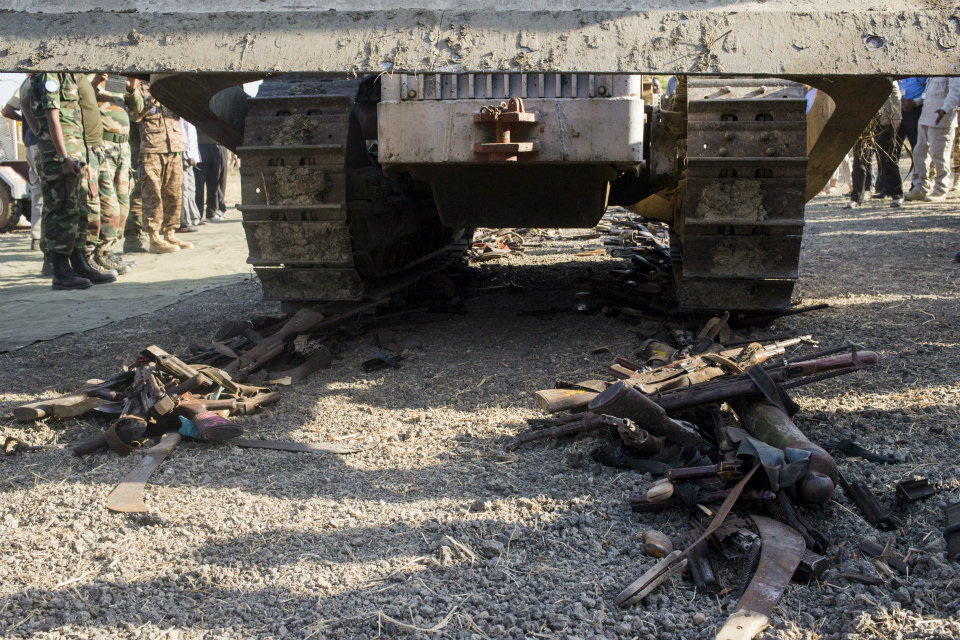"If we embrace action. If we quell the conflicts. If we realise the peaceful societies envisaged in SDG 16...we could save 1.2 million lives"
Statement my Ambassador Jonathan Allen, UK Deputy Permanent Representative to the UN, at the Security Council Briefing on Small Arms and Light Weapons

Thank you Mr President.
And thank you to our briefer, High Representative Izumi Nakamitsu.
Last year, 560,000 people died at the hands of small arms and light weapons.
That’s more than one death every minute, of every day, for an entire year. That is the tragic reality that the Secretary-General’s report brings to life.
Illicit small arms are tools of daily destruction. There’s never a shortage. They’re easy to acquire. And they have an unparalleled impact on lives and communities.
Saferworld estimate that the majority of direct conflict deaths in the developing world are the result of the use of small arms.
Mr. President, the hundreds of thousands of deaths are just the tip of the iceberg. Illicit small arms add fuel to the fire of armed conflicts around the world. They facilitate the most heinous human rights violations and abuses. They are the preferred instruments of war for those who carry out mass killings and rape. They equip terrorists and violent extremists. And where you find transnational criminals dealing in human lives, illicit drugs or illegal wildlife products, there is little doubt you will also find small arms.
Nowhere is this more apparent than in South Sudan. It is no longer just soldiers who carry weapons. Small arms have become the norm. When they become violent, local level disputes are not resolved with homemade traditional weapons, but with guns. Even children herding cattle must carry arms to protect themselves and their livelihood. In this culture of weapons, local disputes now escalate faster and increasingly result in large-scale casualties. For a country torn apart by a national level conflict, this is a price that South Sudanese communities cannot afford to pay. Armed fighting widens rifts between groups and entrenches issues, and community conflict resolution is also far less effective when councils are faced with heavily armed groups.
And the problem doesn’t stop at the border of conflict zones. Transfers of weapons and trained fighters spread the threat to neighbouring countries. We have seen this in Somalia, and elsewhere. If we are to make any progress in tackling this challenge, we need to work collectively to strengthen arms controls, destroy excessive stockpiles and tackle the drivers of instability and conflict, which fuel the demand for illicit weapons.
It is for these reasons that we were proud to adopt Resolution 2220 in 2015 and continue the Council’s focus on this important issue.
Mr. President, outside of the Council, the Arms Trade Treaty (ATT) is one of our most powerful tools in the ongoing fight to stop irresponsible arms transfers. The Treaty’s vision of a globally well-regulated, legal trade in arms is one that the United Kingdom fully supports. Universalisation, especially getting the right states around the table, must remain a priority. Greater participation will increase the Treaty’s influence, strength and reputation. We encourage all States which have not yet done so to make ratification or accession a national priority.
And universalisation must go hand in hand with implementation. That means doing all we can to stop diversion, tackle corruption, dismantle trafficking networks and strengthen information sharing.
Mr. President, since the UN Programme of Action was adopted in 2001, we have seen more and more States take action to improve stockpile management. This is a recognition of the impact on their communities, of weapons diverted from national stockpiles to criminal activity or the devastating consequences of explosions of ammunition depots.
As we look ahead to the Third Review Conference on the implementation of the UN Programme of Action and the International Tracing Instrument next year, it is important that we continue to encourage states to prioritise resources for stockpile security and surplus destruction.
The UK is proud to have provided technical and financial support both bilaterally and through regional and multilateral organisations such as the African Union, the OSCE and the Commonwealth. Through this, we are helping countries to strengthen arms control frameworks, implement better stockpile management procedures and tackle the drivers of terrorism, crime, poverty and exclusion, which fuel the demand for illicit weapons.
Mr. President, I’d like to conclude with a forward look to 2030. A report recently published by Small Arms Survey shows us what the world could look like if we all implement violence reduction initiatives.
If we embrace action. If we quell the conflicts. If we realise the peaceful societies envisaged in SDG 16. If we do all of this, we could save 1.2 million lives. That Mr. President is an outcome which would be fitting of the body charged with upholding international peace and security.
Thank you.